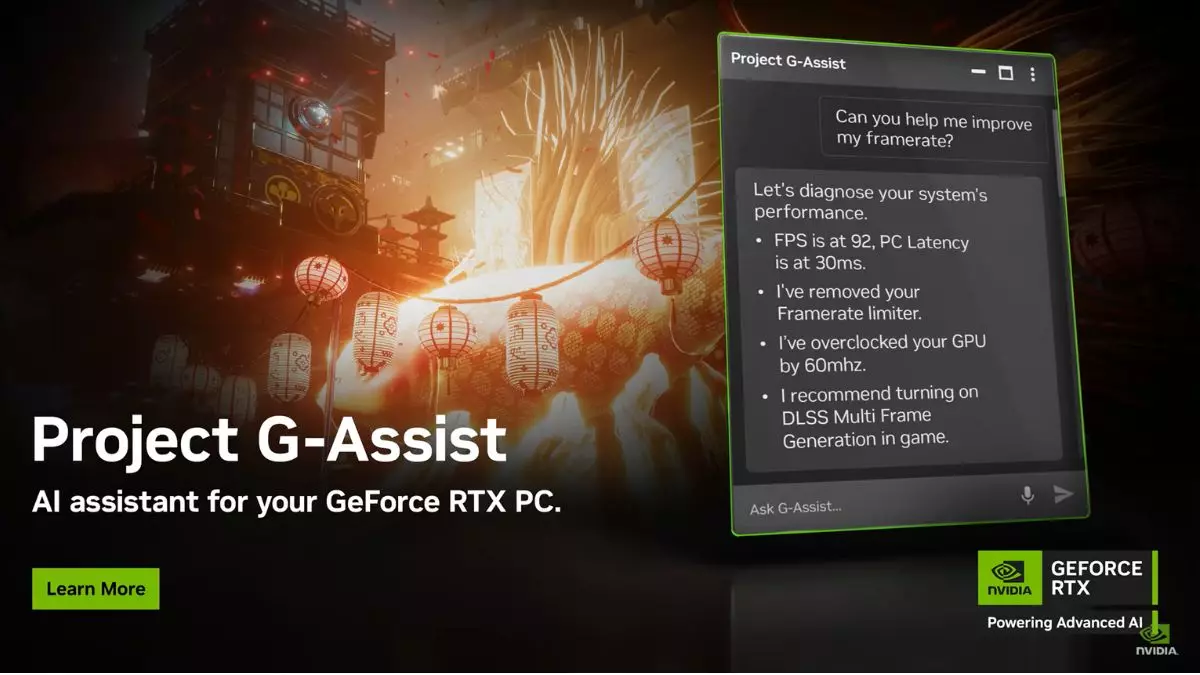Nvidia has just stirred waves in the tech pool with the announcement of Project G-Assist, a local AI assistant specifically designed for GeForce RTX GPU desktop PCs. This innovative tool doesn’t merely offer an enhancement in gaming; it creates a paradigm shift fostering a more interactive and personalized playing experience. It’s about time that technology moves beyond just pixels and frames, diving into how we actively engage with the games we love.
What’s particularly refreshing about G-Assist is its commitment to local processing. In an age where data privacy hangs by a thread, the assurance that user data never traverses beyond the confines of a personal machine is not just reassuring but revolutionary. By eliminating concerns regarding external data exploitation, Nvidia is not just selling a product; it’s prioritizing user integrity in a world that often overlooks it. The notion that we can query, strategize, and receive feedback without compromising our information is indeed a tantalizing prospect.
Capable and Intuitive: A Gamer’s Best Companion
By incorporating voice prompts alongside text, G-Assist transcends traditional user interface limitations. Gamers often juggle complex controls and commands, and the ability to—orchestrate game settings and performance metrics vocally provides a layer of immersion that prior AI models lacked. Picture yourself in a heated multiplayer session, effortlessly adjusting your settings just by speaking; G-Assist makes that a reality.
Notably, the AI assistant doesn’t stop at simple queries. Designed to analyze replays and offer meaningful feedback, it allows users to reflect on gameplay strategies with an analytical eye. This contrasts sharply with the one-size-fits-all approach many gaming analytics tools exhibit. Gamers thrive on personalization, and G-Assist embraces this ethos, providing tailored advice that aligns directly with individual play styles.
Performance Monitoring: A Game-Changer for Serious Gamers
One of the standout features of Project G-Assist is its capability to monitor performance metrics in real time. Gamers are often fixated on their FPS, latency, and GPU usage, especially when delving into the competitive realm. This function transforms not only how gamers perceive efficiency but also how they approach competitive gaming as a whole.
With the ability to manage power efficiency, overclocking capabilities, and thermal performance, G-Assist acts like a performance coach, guiding players to operate at their optimal levels. Tailoring gaming setups to specific preferences and hardware capabilities has long been a challenge; this AI assistant significantly surmounts that hurdle, creating avenues for both novice and seasoned gamers to excel without diving deep into the technical jargon.
A Localized Solution Without the Strings Attached
Perhaps the most commendable point about G-Assist is its effortless accessibility; no subscription fees, no intrusive latency, just immediate benefits from an innovative technology. In a market overwhelmed by recurring costs and service models that often leave customers dissatisfied, Project G-Assist stands as a beacon of hope; it offers substantial value without tying users to an everlasting financial commitment.
Though currently available in English only, the potential for multilingual support looms large. As we navigate a global gaming community, the need for inclusivity in technical advancements has never been clearer. Nvidia’s openness to evolve with support for various languages could very well enhance G-Assist’s reach, enabling gamers from every corner of the globe to tap into its vast capabilities.
Nvidia is not merely releasing a product; it’s establishing a revolutionary concept that celebrates user privacy, gamer’s individuality, and performance mastery through intuitive AI. The landscape of gaming assistants may never be the same again.


Leave a Reply